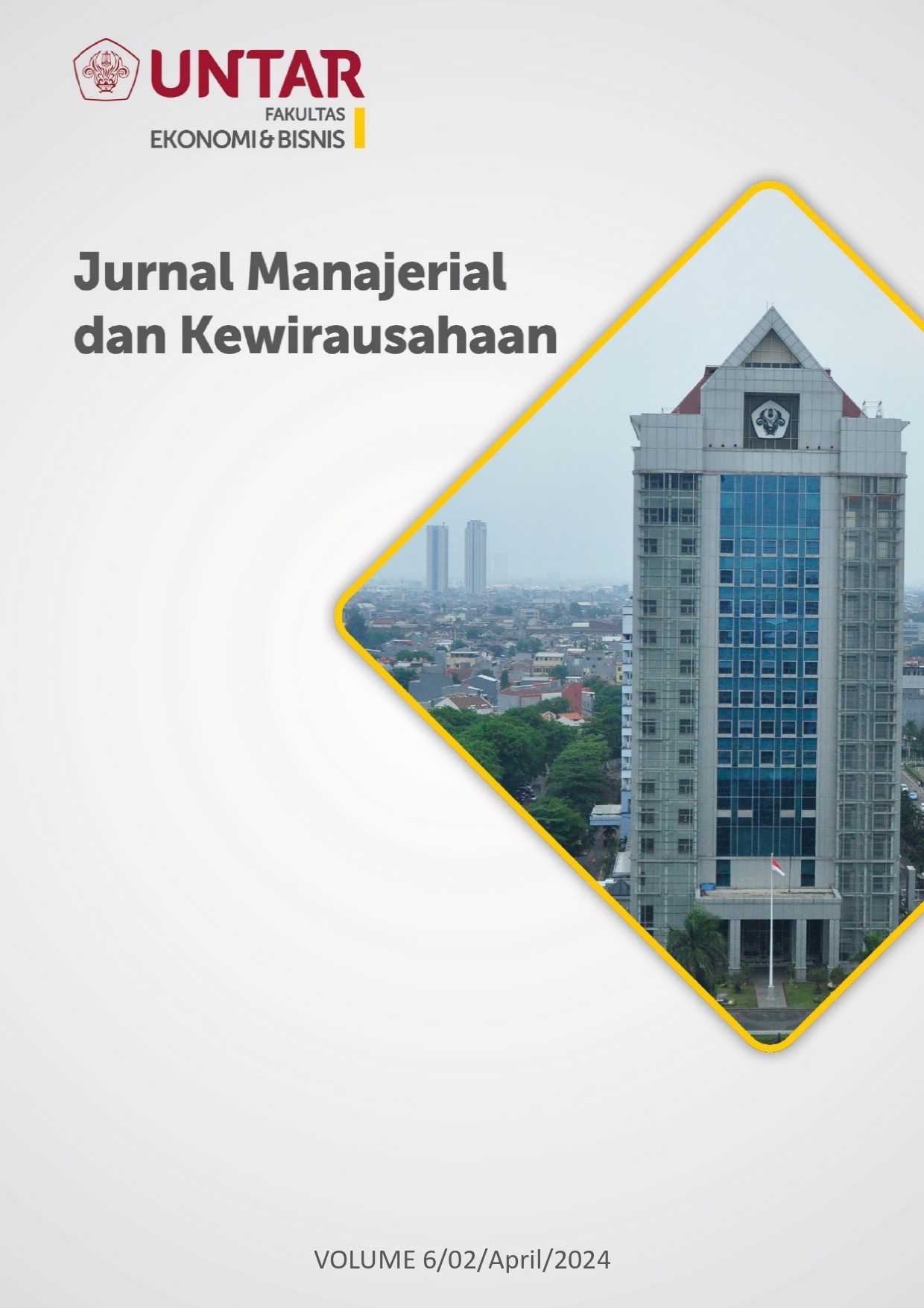Pengaruh Penilaian Lebih Dekat dengan Wirausaha dan Stigma Lebih Dekat dengan Kegagalan Wirausaha terhadap Niat Berwirausaha
Main Article Content
Abstract
The purpose of this study was to examine whether close environmental factors and the stigma of failure in entrepreneurship affect entrepreneurial intentions and are mediated by individual entrepreneurial orientation in private university students in West Jakarta. This study uses non-probability sampling techniques. The number of samples in this study amounted to 277 student respondents. The results showed that the individual entrepreneurial orientation variable mediates the assessment of closer to the environment on entrepreneurial intention, but the stigma of failure in entrepreneurship has no effect on entrepreneurial intention.
Article Details
Section

This work is licensed under a Creative Commons Attribution-NonCommercial-ShareAlike 4.0 International License.
This work is licensed under a Jurnal Muara Ilmu Ekonomi dan Bisnis Creative Commons Attribution-ShareAlike 4.0 International License.,/p>
References
Ambad, S. & Damit, D. (2016). Determinants of Entrepreneurial Intention among Undergraduate Students in Malaysia. Dalam Procedia Economics and Finance, 108-114.
Covin, J. G., Rigtering, J. P. C., Hughes, M., Kraus, S., Cheng, C. F., & Bouncken, R. B. (2020) Individual and Team Entrepreneurial Orientation: Scale Development and Configurations for Success. Journal of Business Research, 112, 1–12. https://doi.org/10.1016/j.jbusres.2020.02.023
Dewi, N. P. L. R. & Nurcaya, I. N. (2017). Niat Berwirausaha di Kalangan Mahasiswa Fakultas Ekonomi dan Bisnis Universitas Udayana Dan Universitas Warmadewa, 6(4), 2191-2221.
Dickel, P., & Eckardt, G. (2021). Who wants to be a social entrepreneur? The role of gender and sustainability orientation. Journal of Small Business Management, 59(1), 196–218. https://doi.org/10.1080/00472778.2019.1704489
Ferreira, F. A. F., Jalali, M. S., Bento, P., Marques, C. S. E. and Ferreira, J. J. M. (2017), “Enhancing individual entrepreneurial orientation measurement using a metacognitive decision makingbased framework”, The International Entrepreneurship and Management Journal, Vol. 13 No. 2, pp. 327-346
Filser, M., Eggers, F., Kraus, S., & Málovics, É. (2019). The effect of financial resource availability on entrepreneurial orientation, customer orientation and firm performance in an international context: an empirical analysis from Austria and Hungary. Journal for East European Management Studies, 7– 30.
Frunzaru & Cismaru, 2018 “The impact of individual entrepreneurial orientation and education on generation z”s intention toward entrepreneurship.”
Hamel, C. & Wijaya, A. (2020). Pengaruh Orientasi Kewirausahaan dan Orientasi Pasar terhadap Kinerja Usaha UKM di Jakarta Barat. Jurnal Manajerial dan Kewirausahaan, 2(4), 863-872. https://doi.org/10.24912/jmk.v2i4.9865
Howard, M. C. & Floyd, A. (2021), “Reassessing passion and perseverance as dimensions of individual entrepreneurial orientation: a conceptual and empirical investigation into theory and measurement”, Entrepreneurship Research Journal De Gruyter, https://doi.org/10.1515/erj-2020-0383
Kolvereid, L. & Isaksen, E. (2006), “New business start-up and subsequent entry into selfemployment”, Journal of Business Venturing, Vol. 21 No. 6, pp. 866
Landier, A. (2006), Entrepreneurship and the stigma of failure, Working paper, University of Chicago, Graduate School of Business, Chicago, IL, https://doi.org/10.2139/ssrn.850446
Lopes, J. M., Gomes, S., Santos, T., Oliveira, M., & ... (2021). Entrepreneurial Intention before and during COVID-19—A Case Study on Portuguese University Students. Education Sciences. https://www.mdpi.com/1132766
Martins, I., & Perez, J. P. (2020). Testing mediating effects of individual entrepreneurial orientation on the relation between close environmental factors and entrepreneurial intention. International Journal of Entrepreneurial Behavior & Research, 26(4), 771-791. https://doi.org/10.1108/ijebr-08-2019-0505
Monica, D. & Wijaya, A. (2021). Pengaruh Close Environmental Factors terhadap Entrepreneurial Intentions Dimediasi oleh Individual Entrepreneurial Orientation. Jurnal Manajerial dan Kewirausahaan, 3(2), 335-344. https://doi.org/10.24912/jmk.v3i2.11877
Santos, F. J., Roomi, M. A. and Linan, F. (2016), “About gender differences and the social environment in the development of entrepreneurial intentions”, Journal of Small Business Management, Vol. 54 No. 1, pp. 49-66.
Santos, G., Susana, C., & Ferreira, J. J. M. (2020). Passion and perseverance as two new dimensions of an Individual Entrepreneurial Orientation scale. Journal of Business Research, 112(March), 190–199.
Simmons, S. A., Wiklund, J., & Levie, J. (2014), “Stigma and business failure: implications for entrepreneurs’ career choices”, Small Business Economics, Vol. 42 No. 3, pp. 485-505.
Sugiyono, S. (2017). Metode penelitian pendidikan:(pendekatan kuantitatif, kualitatif dan R & D). In Bandung: Alfabeta.
Sugiyono, S. (2018). Research Methods: Quantitative, Qualitative, and R&D. Bandung: Alfabeta.
Tiwari, P., Bhat, A. K., & Tikoria, J. (2017). The role of emotional intelligence and self-efficacy on social entrepreneurial attitudes and social entrepreneurial intentions. Journal of Social Entrepreneurship, 8(2), 165-185. https://doi.org/10.1080/19420676.2017.1371628
Wiklund, J. & Shepherd, D. (2005), “Entrepreneurial orientation and small business performance: a configurational approach”, Journal of Business Venturing, Vol. 20 No. 1, pp. 71-91.

